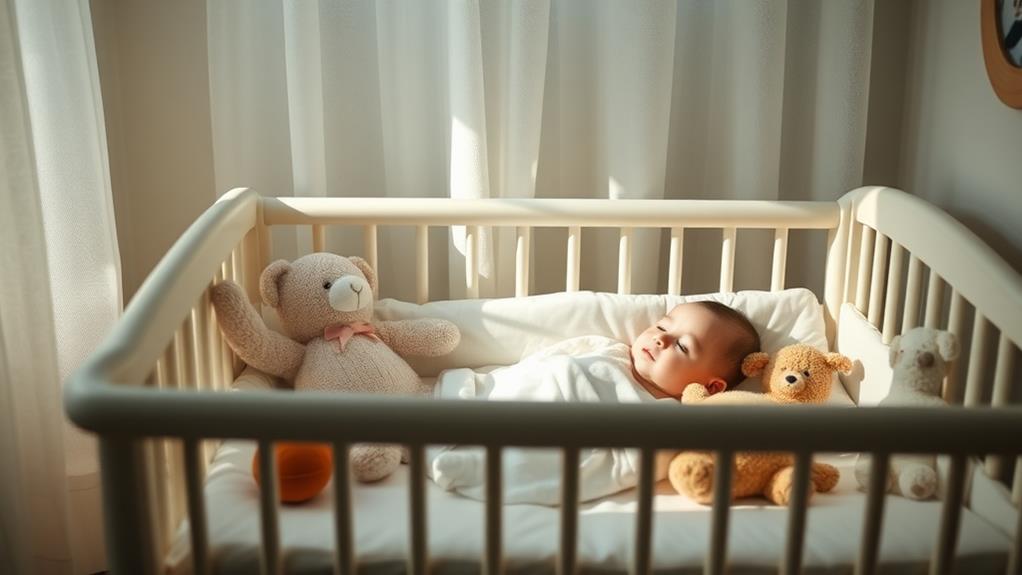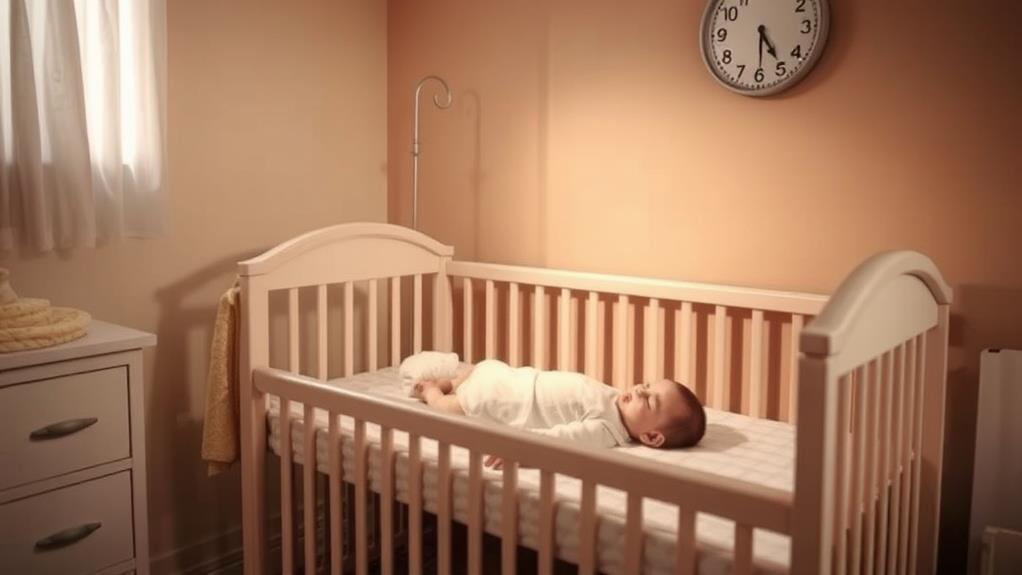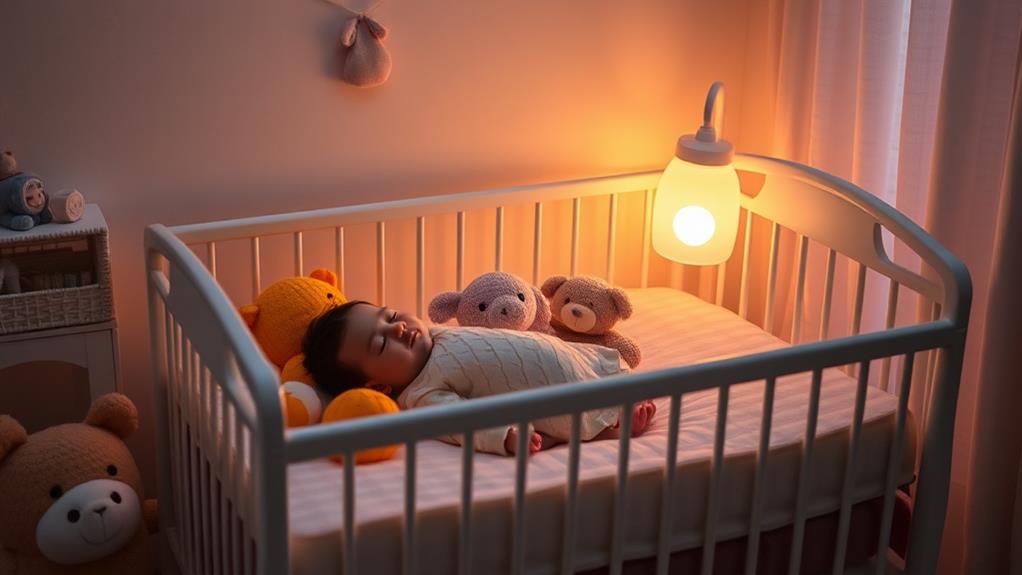When you think about letting babies cry, it can evoke strong feelings and opinions. You might wonder if it's harmful or beneficial for their development. Understanding the nuances of crying is fundamental, as it plays an important role in how infants communicate their needs and emotions. Striking a balance between responding to their cries and allowing them to self-soothe is essential. But what happens when you find that balance? The implications go beyond mere crying; they touch on trust, independence, and emotional resilience in your child's formative years.
Understanding Crying in Infants

Crying is a natural response in infants, serving as their primary means of communication. When your baby cries, they're trying to tell you something important. It could be hunger, discomfort, or the need for a cuddle—like a tiny alarm system alerting you to their needs. Isn't it funny how such a small person can create such a big noise?
You might wonder why babies can't just use words, but they haven't learned to talk yet! Instead, they rely on different types of cries. A hungry cry sounds different from a tired cry, and once you tune in, you'll start to recognize these patterns. It's like learning a new language, and trust me, it gets easier with practice.
Sometimes, babies also cry to release frustration or to let off steam. Just like adults need to vent after a long day, little ones have their own ways of expressing emotions.
Emotional Benefits of Crying
Expressing emotions through tears can be incredibly beneficial for your baby's emotional development. When your little one cries, they're not just being dramatic; they're actually communicating their feelings. Think of crying as their way of saying, "Hey, I need something!" It helps them release pent-up emotions, just like how you might feel better after a good cry.
Letting your baby cry occasionally teaches them how to self-soothe, which is an essential skill for later in life. When they figure out how to calm themselves, they gain confidence in handling their feelings. Plus, you're showing them it's okay to feel sad sometimes. It's a part of life!
Now, don't worry too much if your baby's tears pull at your heartstrings. It's normal to want to comfort them, and you should! However, giving them a little space to cry can be healthy. Just remember, it's all about balance.
Developmental Perspectives on Crying

As your baby develops, crying plays an essential role in helping them learn about their environment. It's like their first language! When you respond to their cries, you teach them that they're safe and loved. This builds trust and helps them feel secure.
It's important to remember that crying is a normal part of growing up.
Sometimes, you might feel tempted to let them cry it out, thinking it'll help them be more independent. But don't forget, they're still figuring out the world around them. Each cry is a step in their development, helping them learn to express emotions and signals.
Psychological Impact on Babies
The psychological impact of letting babies cry can be significant, influencing their emotional and mental development. When you let your baby cry, they might feel abandoned or anxious, which can affect their sense of security.
Babies thrive on connection, and when they cry, they're often looking for comfort. If they don't receive that comfort, it could lead to issues like increased stress and difficulty trusting others later on.
Picture this: a little one crying in their crib, thinking, "Where's my superhero?" You wouldn't want them feeling like nobody's coming to save the day!
On the flip side, if you respond to their cries consistently, you're helping them learn that they can rely on you. This builds a strong emotional foundation.
It's important to find a balance. Sometimes, a short cry is okay, especially if it helps them learn self-soothing skills.
However, frequent, prolonged crying can leave emotional scars. So, the next time your baby cries, remember that your response shapes their understanding of love and safety.
After all, every little coo and cry is a key to revealing their emotional world!
Addressing Common Misconceptions

Many parents worry that letting their babies cry will lead to long-term emotional damage. It's totally understandable to feel that way, but let's clear up some of these misconceptions.
First off, a little crying can actually be a normal part of learning how to self-soothe. Babies, just like you and me, need to figure things out on their own sometimes, like how to calm down when they're upset.
Another common belief is that if you let a baby cry, they'll think you don't love them. That couldn't be further from the truth! Babies know you're there, and they feel your love even when they're upset. Think of it like learning to ride a bike; you might wobble and fall a bit, but with practice, you get better.
Now, some folks worry that if they don't respond immediately, their baby might feel abandoned. While you want to be attentive, it's also important to give them space to learn.
The Role of Parental Response
Parental response plays a crucial role in a baby's emotional development. When your little one cries, how you respond can shape their understanding of the world. If you rush to comfort them, you're teaching them they're safe and loved. It's like giving them a warm hug for their heart!
On the flip side, if you ignore their cries, they might start to feel anxious and uncertain.
Every time you soothe your baby, you're building a bond of trust. That trust helps them feel secure, which is super important as they grow. Your reactions can help them learn how to express their feelings, too. So, when they cry, think of it as their way of saying, "Hey, I need you!" It's not just noise; it's communication.
Now, you might wonder if you're spoiling them by responding too quickly. Don't worry! Babies aren't trying to manipulate you. They just want connection. The key is finding a balance.
Strategies for Safe Crying

Understanding how to respond to your baby's cries is just the beginning. You'll want to create an environment where safe crying can happen. Start by ensuring your baby is in a comfortable space. Check for things like diaper changes, hunger, or even a little gas.
If they're fed and dry, it might be time to let them cry a bit. Choose a safe spot, like the crib, where they can express themselves without any danger. You can stay nearby, so you're still within earshot, ready to jump in if necessary.
You might find that letting them cry for a few minutes gives them a chance to self-soothe. Remember, it's okay for you to take a breather too! You can step into another room for a moment, breathe deeply, and recharge. After all, even superheroes need a break.
When you feel ready, return to your little one, maybe with a soothing voice or gentle touch. Your calm presence can help them feel secure. Balancing this safe crying with your responses will help both of you grow through the experience!
Balancing Crying With Comfort
Finding the right balance between letting your baby cry and providing comfort can feel like walking a tightrope. On one hand, you want to give your little one the chance to learn self-soothing skills. On the other, you don't want to leave them feeling abandoned or scared. So, what's a parent to do?
Start by observing your baby's cues. If they're fussing but not in distress, it might be okay to let them cry for a short while. However, if the crying escalates, it's time to swoop in for some comfort. A gentle pat on the back or a soothing voice can work wonders.
Remember, it's not about ignoring their cries but finding that sweet spot between allowing them to express themselves and reassuring them they're safe.
Also, trust your instincts. Every baby is different, and you know yours best. Sometimes, a little cry is just what they need to learn, but other times, they might need your warm embrace.
Balancing crying with comfort is all about being attentive and responsive. You're doing great, and soon enough, both you and your baby will find your rhythm!
Expert Opinions on Crying

When it comes to the topic of letting babies cry, expert opinions vary widely. Some experts say it's okay to let your baby cry for a bit, while others believe you should respond right away. It can feel overwhelming, right?
One popular view is that a little crying helps babies learn to self-soothe. They argue that if you always pick them up at the first whimper, they mightn't learn how to calm themselves down later.
On the flip side, some pediatricians stress that responding to your baby's cries builds trust and security. They believe consistent care helps develop strong emotional bonds. Who could argue with that?
It's a bit like choosing between chocolate or vanilla ice cream—both are delicious, but you might prefer one over the other!
In the end, it's essential to reflect on what feels right for you and your baby. Balancing your instincts with expert advice can lead to the best outcomes.

